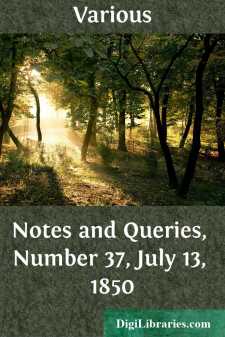Categories
- Antiques & Collectibles 13
- Architecture 36
- Art 48
- Bibles 22
- Biography & Autobiography 813
- Body, Mind & Spirit 142
- Business & Economics 28
- Children's Books 15
- Children's Fiction 12
- Computers 4
- Cooking 94
- Crafts & Hobbies 4
- Drama 346
- Education 46
- Family & Relationships 57
- Fiction 11828
- Games 19
- Gardening 17
- Health & Fitness 34
- History 1377
- House & Home 1
- Humor 147
- Juvenile Fiction 1873
- Juvenile Nonfiction 202
- Language Arts & Disciplines 88
- Law 16
- Literary Collections 686
- Literary Criticism 179
- Mathematics 13
- Medical 41
- Music 40
- Nature 179
- Non-Classifiable 1768
- Performing Arts 7
- Periodicals 1453
- Philosophy 64
- Photography 2
- Poetry 896
- Political Science 203
- Psychology 42
- Reference 154
- Religion 513
- Science 126
- Self-Help 84
- Social Science 81
- Sports & Recreation 34
- Study Aids 3
- Technology & Engineering 59
- Transportation 23
- Travel 463
- True Crime 29
Notes and Queries, Number 37, July 13, 1850
by: Various
Categories:
Description:
Excerpt
NOTES
THE AUTHOR OF THE "CHARACTERISTICS."
Lord Shaftesbury's Letters to a young Man at the University, on which Mr. SINGER has addressed to you an interesting communication (Vol. ii., p. 33.), were reprinted in 1746 in a collection of his letters, "Letters of the Earl of Shaftesbury, author of the Characteristicks, collected into one volume: printed MDCCXLVI." 18mo. This volume contains also Lord Shaftesbury's letters to Lord Molesworth, originally published by Toland, with an introduction which is not reprinted; a "Letter sent from Italy, with the notion of the Judgment of Hercules, &c., to my Lord ——"; and three letters reprinted from Lord Shaftesbury's life in the General Dicionary, which was prepared by Dr. Kippis, under the superintendence of Lord Shaftesbury's son, the fourth earl.
In my copy of the original edition of the Letters to a young Man at the University, two letters have been transcribed by an unknown previous possessor. One is to Bishop Burnet, recommending young Ainsworth when about to be ordained deacon:—
"To the Bishop of Sarum.
"Reigate, May 23. 1710.
"My Lord,—The young man who delivers this to your Lordship, is one who for several years has been preparing himself for the ministry, and in order to it has, I think, completed his time at the university. The occasion of his applying this way was purely from his own inclination. I took him a child from his poor parents, out of a numerous and necessitous family, into my own, employing him in nothing servile; and finding his ingenuity, put him abroad to the best schools to qualify him for preferment in a peculiar way. But the serious temper of the lad disposing him, as I found, to the ministry preferably to other advantages, I could not be his hindrance; though till very lately I gave him no prospect of any encouragement through my interest. But having been at last convinced, by his sober and religious courage, his studious inclination and meek behaviour, that 'twas real principle and not a vanity or conceit that led him into these thoughts, I am resolved, in case your lordship thinks him worthy of the ministry, to procure him a benefice as soon as anything happens in my power, and in the mean time design to keep him as my chaplain in my family.
"I am, my Lord, &c.,
"SHAFTESBURY."
The second letter inserted in my copy is to Ainsworth himself, dated Reigate, 11th May, 1711, and written when he was about to apply for priest's orders. But the bulk of this letter is printed, with a different beginning and ending, in the tenth printed letter, under date July 10th, 1710, and is there made to apply to Ainsworth's having just received deacon's orders. The beginning, and ending of the letter, as in MS., are—
"I am glad the time is come that you are to receive full orders, and that you hope it from the hands of our great, worthy, and excellent Bishop, the Lord of Salisbury. This is one of the circumstances" [then the letter proceeds exactly as in the printed Letter X., and the MS. letter concludes:] "God send you all true Christianity, with that temper, life, and manners which become it.
"I am, your hearty friend,
"SHAFTESBURY."
I quote the printed beginning of Letter X., on account of the eulogy on Bishop Burnet:—
"I believed, indeed, it was your expecting me every day at —— that prevented your writing since you received orders from the good Bishop, my Lord of Salisbury; who, as he has done more than any man living for the good and honour of the Church of England and the Reformed Religion, so he now suffers more than any man from the tongues and slander of those ungrateful Churchmen, who may well call themselves by that single term of distinction, having no claim to that of Christianity or Protestant, since they have thrown off all the temper of the former and all concern or interest with the latter....












